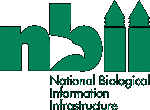The NBII home page (http://www.nbii.gov) is the point of access to a growing list of guides, directories, and inventories of biological data and information aimed at agencies, scientists, educators, students, and more. The data come from within BRD and from many other government and non-government agencies and organizations.
NBII also runs a data clearinghouse that uses metadata to go beyond pointing users to data. The NBII’s ultimate goal is "that users will be able to browse for, identify, retrieve, integrate, and manipulate data from sources around the globe". One major milestone in implementing the NBII’s goal is the development of an accepted set of metadata standards. BRD, via the Biological Data Working Group (BDWG), is developing a metadata standard for documenting biological data and information that is compatible with the Federal Geographic Data Committee (FGDC) metadata standard for geospatial data. The BDWG has representation from agencies and academic organizations around the country that have a stake in developing metadata standards.
The group is mandated to provide very broad seamless discovery and access to biological data and there is a recognition that a large amount of biological data exist outside the agency’s administrative grasp. Thus, there is a strong desire to partner with academic research groups such as LTER—LTER being a major producer of on-line ecological data and an early leader in developing ecological metadata standards.
The LTER Associate Director for Information Management recently attended a meeting at the USGS Center for Biological Informatics (CBI) in Denver with some of the NBII staff to outline some of the mutually beneficial results to be had from an interaction between LTER and BRD/NBII. During the meeting, four areas of possible collaboration and cooperation were discussed:
Ecological Metadata Development
- NBII is leading the BDWG that is developing FGDC compatible biological metadata standards
- Both LTER and NBII are working on methods of making disparate metadata interoperable
Education, Outreach, and Training
- NBII metadata training efforts
- LTER data management training efforts
Regional Collaboration Possibilities
- NBII is taking the approach of developing regional nodes to support their data clearinghouse function
- Would fit with the LTER model of regional data centers
National Collaboration Possibilities
- Partner and cooperate in critical and applicable areas
- Leverage existing limited funding
- Reduce reinvention
- Share technical information
- NBII participation in the nascent bio-informatics consortium
- Individuals within NBII can serve as PI’s oncollaborative grant proposals
As a result of this discussion two initial action items were identified:
- LTER will have representation on the BDWG. John Porter (VCR) will be the unofficial representative until the Information Management committee can appoint one.
- NBII will have an opportunity to interact directly with LTER information managers.
Anne Frondorf, National Program Manager for NBII, will attend the LTER Data Management Committee Meeting in August, 1999 and present information about the NBII effort to the broader data management group. At this meeting a sub-group will work with Anne to try and develop the details of some of the broader participation in the areas outlined above.

 Enlarge this image
Enlarge this image